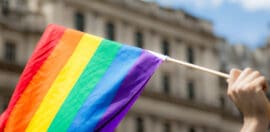Solidarity when it’s needed most: supporting Australian trans and gender diverse folk

8 March 2022 at 8:28 am
Nevena Spirovska shares advice on how organisations can demonstrate an important display of solidarity for the trans and gender diverse community in the workplace.
For many in Australia’s LGBTIQA+ community, and in particular the trans and gender diverse community, the last couple of months have felt unrelenting with our lives having been, once again, the subject of intense media scrutiny and political debate.
The federal government’s dangerous and divisive Religious Discrimination Bill put on full display the bigotry of some parliamentarians as they debated who was and was not deserving of rights. But even before it was shelved indefinitely, it was clear the bill was deeply flawed. It handed a positive right to people of faith to discriminate against others and attempted to override all existing state and territory discrimination laws in the process. LGBTIQA+ Australians should not face discrimination because of who we are, who we love, or our faith (or lack thereof). Our laws should protect us all equally.
Immediately after the Religious Discrimination Bill, Tasmanian Liberal Senator Claire Chandler brought forward the “Save Women’s Sports” Bill, a proposal aimed at amending the Sex Discrimination Act to “clarify” that the operation of single-sex sport on the basis of biological sex was not discriminatory. Transgender advocates spoke out against the bill and the former Tasmanian anti-discrimination commissioner Robin Banks said the bill was “a legislative solution to a non-existent problem.”
Worryingly, legislation of this nature has fuelled increasingly toxic anti-trans rhetoric in “opinion” based media that is not in line with broad community sentiment nor the evidence which supports trans women’s right to play women’s sports. When this malignant discourse is on full public display, many people ask “how can I be a better ally?” While individual action, advocacy and responsibility are critically important, changes we make at an organisational level can demonstrate an important display of solidarity for the trans and gender diverse community between workplaces and the broader social services sector signalling our understanding and respect.
Practical applications of this support includes the consideration of the kind of environments our organisations create for trans and gender diverse employees. Simple measures such as removing binary toilet signage and replacing it with ones that reflect the amenities offered using images of urinals and toilets in place of gendered images, proactively including pronouns in emails and incorporating them into meeting introductions to standardise their use, and creating or updating diversity and inclusion policies so that they reflect current best practice guidance.
Further steps can also be taken by developing a transition plan and leave for trans and gender diverse employees who choose to affirm their identity. Implemented correctly, gender affirmation leave has the capacity to alleviate some of the biggest practical barriers to affirming a person’s gender identity.
For-purpose organisations also have a responsibility to create a positive culture of respect and inclusion by embedding formal structures that promote the reporting of any instances of discrimination and vilification. Ensuring this kind of discrimination does not occur is a fundamental duty of any organisation but it also means workplaces can retain valuable workers, enhance workplace morale and be recognised as an employer of choice.
Training and professional development delivered by an LGBTIQA+ community-controlled organisation represents an opportunity to upskill staff to better recognise and support the needs of trans and gender diverse and LGBTIQA+ people, especially if your organisation provides service provision or interacts with community members. Organisations like the Victorian Equal Opportunity and Human Rights Commission recommended that face-to-face inclusion training is provided at least once every two years. In addition to taking positive steps to train all employees, including executives, managers and senior staff about transgender issues and equal opportunity law, it also helps to identify areas for improvement to further stamp out discrimination that may be occurring in your workplace.
Valuing diversity in your workplace has a number of benefits – not just for those who may be vulnerable to discrimination – but for all employees. By recognising all of the ways in which your employees differ, including differences in gender identity, you can create an environment where all employees can feel safer, respected and valued.







